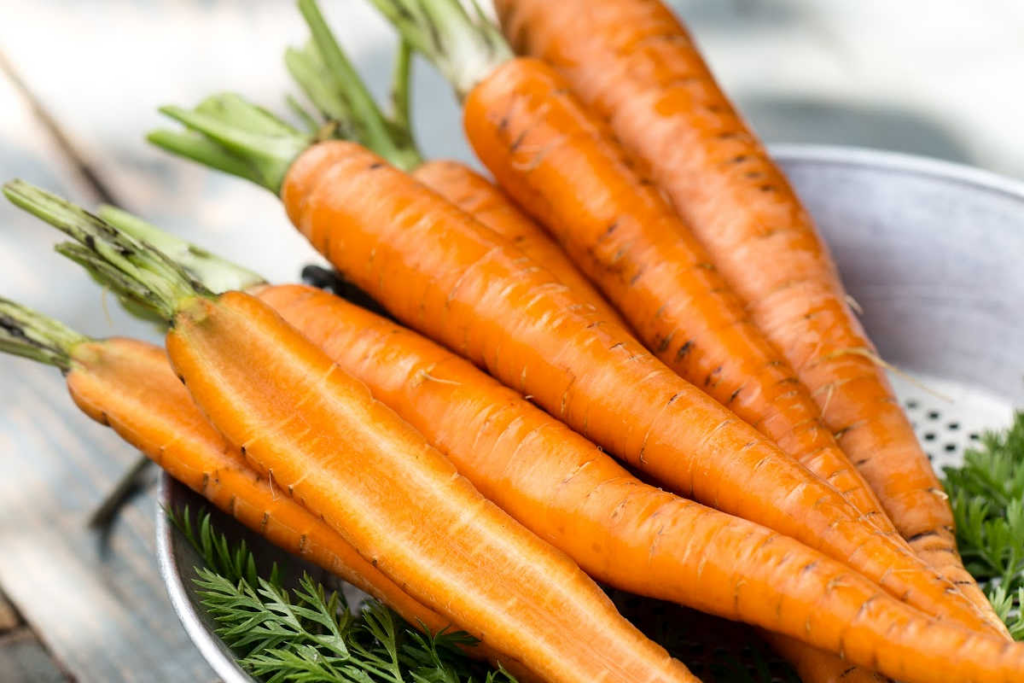To know if carrots are bad, kindly check the texture, appearance, and smell. Fresh carrots have bright orange skin that is smooth and tight. Firm and crisp texture is better than soft and mushy.
There are several things to consider on how to know if carrots are bad and this comprehensive article will unveil them all.
Carrots came from the rich soils of ancient Persia and have gone on a fantastic trip in the world of food, enchanting palates with their bright orange color, earthy sweetness, and adaptability.
Their history goes back to the 10th century BCE when they were grown both for their culinary value and for what were thought to be their healing qualities.
Over time, carrots made their way to Europe along the Silk Road and finally became an essential part of food worldwide.
Carrots are a great example of how creative people can be and how robust flavours can be over time.
They go well with salads, soups, stews, and even sweets because they are versatile. Their crunch makes a significant difference in texture, and their sweetness goes well with many different flavours.
Whether eaten raw, grilled, or puréed, carrots always add a healthy boost and a magical touch to a meal. As we keep exploring the world of food, carrots stand out as a sign of versatility and flavour that lasts.
Their appearance on tables around the world shows how versatile, healthy, and able to make even the simplest dishes taste better they are.
Carrots are not just an ingredient; they are like a chameleon in the kitchen, going well with a wide range of dishes and pleasing people worldwide.
They can go wrong if you do not store or handle carrots properly. If you know how to spot fresh carrots, you can be sure they have the best taste, texture, and nutritional value.

Signs That Carrots Might Not Be Fresh and Safe
To know if carrots are bad, consider how they look, feel, and smell. Some essential signs that carrots might not be fresh and safe to eat anymore are:
1. When it lacks the Vibrant Orange Color and its top isn’t green.
Fresh carrots should be bright orange, which means they have a lot of beta-carotene. Vitamin A is essential for your eyesight, immune system, and cell growth.
Beta-carotene is a precursor to vitamin A. If the carrots are dull or yellow, they may not be as healthy because they have lost some of their beta-carotene.
Carrot tops, called carrot greens, should be challenging and bright green. This means that the carrots were just picked and are still fresh.
If the carrot tops are wilted or discoloured, the carrots have been picked for a while and may not be as fresh as possible.
2. When its surface isn’t Smooth and has Dark Spots or Lines
Another way to know if carrots are bad is to evaluate The skin layer. The skin on fresh carrots should be smooth and taut, with no wrinkles or other flaws. This means the carrots are still hard and crisp and have not lost any water.
Carrots with wrinkled or shrunken skin may be soft or mushy because they have lost water. Still fresh carrots should not have any dark spots or lines on them.
Dark spots could mean that something is rotting or that germs are growing, while lines could mean something is bruised or harmed.
Dark spots or lines on carrots may mean that they are going wrong or that bacteria is growing on them, which means that you might not be able to eat them anymore.
Small, single dark spots are not a big deal and can be cut off. However, large dark spots or lines mean the carrots have gone wrong and should be thrown away.

3. Presence of Mold Growth and Wrinkling on the surface
There should not be any mould on fresh carrots that you can see. There is a clear sign that something is going wrong.
There is no doubt that carrots have gone wrong and are no longer safe to eat when mould starts to grow on them.
Fresh carrots should have a clean, smooth surface with no mould or fuzzy spots you can see. Carrots with white, fuzzy, or discoloured spots are a sure sign that mould has started to grow on them.
Mould is a fungus that grows best around damp places and can make poisons that make you sick.
These poisons, called mycotoxins, can lead to a range of symptoms, from minor stomach issues to more severe health issues.
Too much wrinkling or shrinking are signs of drying out and lower quality.
Too much peeling or shrinking on carrots indicates they are dehydrated and losing water, which can significantly affect their texture, flavour, and general quality.
Eating twisted or shriveled carrots is possible, but they might not taste as good as fresh, crisp carrots.

4. When its Texture is bland and too soft to touch
Another input on how to know if carrots are bad is from their texture. I always utilize this practical way to check for freshness. How carrots feel tells you much about how fresh and good they are.
Fresh carrots should have a hard, crisp texture, which makes them more appealing for cooking. But as carrots age or get worse, their taste can change in ways that make it clear that they may not be at their best anymore.
When you gently squeeze fresh carrots, they should give way. Because the carrots are complex, they keep their water and have many cell walls, making them crisp and crunchy.
Carrots become soft, squishy, or mushy when they lose water and their cells break down. This loss of hardness makes the carrots less appealing to eat and says that they may not be as healthy as they used to be.
5. When it feels Slimy and bends
A sticky or slippery texture is a clear sign that something is going wrong, and you should not ignore it.
The top of fresh carrots should be smooth and dry, with no signs of wetness or stickiness. If you feel like the carrots are slimy or slippery, bugs have grown on them.
This growth of germs can make poisonous chemicals that make the carrots unsafe to eat. When you bend a fresh carrot, it should break. When a carrot turns easily without breaking, it has lost its toughness and may be about to go wrong.
6. When it lacks a Resounding sound
Fresh carrots make a clear, resonant sound when hit. If the sound is dull or faint, the carrots may have lost water or are beginning to go wrong.

7. When it smells lame and has a bad odour
Carrots often have a mild smell that can tell you a lot about how fresh and good they are. A gentle, earthy smell should come from fresh carrots, which is a sign that they are still good and have not gone wrong.
However, as carrots go wrong, their smell can change in ways that make it clear that they might not be safe to eat anymore.
The smell of fresh carrots should be mild and earthy, like new plants or dirt. Their smell shows that they are real and have not gone wrong.
On the other hand, carrots can smell bad and even strong as they age or as bugs grow on them.
The carrots have gone wrong if they have a strong, unpleasant smell that smells like rotting veggies or sourness.
An unpleasant smell comes from the breakdown of organic chemicals and the release of volatile gasses when food goes bad.
While fresh carrots have a mild odor, they should not be completely odorless. If the carrots have no smell, it could mean that they are past their best or were kept in a way that blocked their natural scent.
If the carrots smell a little sour or soured, that could mean they have gone through natural fermentation, making them taste better and be better for you.
But if fermentation smells solid or unpleasant, the fermentation has gone too far, and the carrots may not taste good anymore.
Impact on Texture and Flavor of Carrots

There are evident changes in texture and flavour in dehydrated carrots that show up as wrinkles or shrinking too much:
1. Loss of Crispness
Fresh carrots have a stiff, crisp feel because they are high in water. If you dry carrots, they get soft and floppy and do not have the delicious crunch of fresh carrots.
2. Dull or Mushy Texture
Strictly dehydrated carrots may lose their crispness and get a dull or mushy texture, making them less functional in cooking.
3. Reduced Flavor Intensity
Not only does drying carrots make them taste worse, but it can also change their texture. If you dry carrots, the sweet and earthy smell that comes with fresh carrots might not be as strong or even go away.
What causes Dark Spots on carrots?
Several factors contribute to the appearance of dark spots or lines on carrots:
1. Bruising
Damage from rough handling or machines during harvesting or shipping can leave dark spots or lines on the surface of carrots.
2. Bacterial Infection
Dark spots or lines can appear because of bacterial growth, and the appearance is often soft or mushy. These spots could mean the food is breaking down and dangerous bacteria are present.
3. Internal Decay
In some cases, fungal infections or lousy storage conditions can lead to internal decay that shows up as dark spots or lines in the carrot’s meat.

FAQs
When stored in the refrigerator, do carrots eventually become spoiled?
You will need to keep your carrots in the refrigerator, but how you keep them will make a difference in the quality of the carrots.
If stored correctly, raw carrots can maintain their quality in the refrigerator for about three to four weeks.
If you slice or chop your carrots before placing them in the refrigerator, they will maintain their freshness for approximately two to three weeks longer than if they were left whole.
When they are no longer fresh, what colour do carrots turn?
Do not consume the carrots, however, if their colour is white and they have a slimy and moist texture, as this is a sign that bacteria are present.
Unpeeled and unwashed carrots may also start to exhibit signs of white and black discolouration at this point.
Why do carrots become soggy when stored in the refrigerator?
It is simply because they’re dehydrated. Do not be alarmed if you find that green-top carrots purchased at the local farmer’s market or grown in your garden regularly have this problem.
Simply cutting off the tops of the vegetables before storing them will prevent the tops from drawing moisture away from the vegetable root while it is in the crisper.
Conclusion
By following these easy steps on how to know if carrots are bad, you can be sure that the carrots you buy are fresh and will add flavour and nutrition to your food. Remember that the right way to store carrots keeps them fresh.
To make them last longer, put them in the crisper box of your fridge, away from foods that give off ethylene, like apples and potatoes. To enjoy the best carrots, you must have a sharp eye and a sophisticated tongue.









